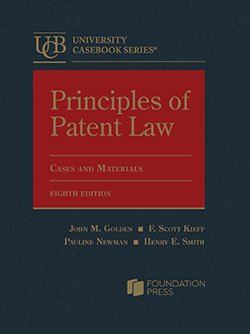- Home
- Principles of Patent Law, Cases and Materials
Principles of Patent Law, Cases and Materials
Principles of Patent Law provides comprehensive coverage of the policies, laws, rules, and practices of the U.S. patent system in a format accessible to students, lawyers, government officials, and business people. The Eighth Edition builds on the strengths of prior editions in combining discussions of the law and theory of patents with instructive case materials.
The Eighth Edition marks a milestone. This edition comes just over twenty-five years after the first edition of
Principles of Patent Law. Updates include newly added excerpts from (1)
Helsinn Healthcare S.A. v. Teva Pharmaceuticals USA, Inc., 139 S. Ct. 628 (2019), on the scope of prior art for purposes of assessing the novelty and nonobviousness of a claimed invention; (2)
Amgen Inc. v. Sanofi, 143 S. Ct. 1243 (2023), on the relationship between the scope of patent claims and the requirement of an enabling disclosure; (3)
Oil States Energy Services, LLC v. Greene’s Energy Group, LLC, 138 S. Ct. 1365 (2018), on the constitutionality of post-issuance proceedings in which the U.S. Patent and Trademark Office may cancel previously issued patent claims; and (4)
Ericsson, Inc. v. D-Link Systems, Inc., 773 F.3d 1201 (Fed. Cir. 2014), on reasonable royalties for standard-essential patents. A teacher’s manual for
Principles for Patent Law is available online and should be updated to reflect the changes in the Eighth Edition by the summer of 2024. With judicious cuts offsetting new additions, the length of
Principles of Patent Law has remained substantially the same across the Seventh and Eighth Editions. We hope that we have thereby succeeded in preserving the Seventh Edition’s spryness while still staying true to the First Edition’s vision.
Imprint: Foundation Press
Series: University Casebook Series
Publication Date: 04/10/2024
John M. Golden, University of Texas School of Law
F. Scott Kieff, George Washington University Law School
Pauline Newman, George Mason University School of Law
Henry E. Smith, Harvard University Law School
CasebookPlus™
This title is available in our CasebookPlus format. CasebookPlus provides support beyond your classroom lectures and materials by offering additional digital resources to you and your students. Anchored by faculty-authored formative self-assessments keyed to our most popular casebooks, CasebookPlus allows students to test their understanding of core concepts as they are learning them in class – on their own, outside of the classroom, with no extra work on your part. CasebookPlus combines three important elements:
- A new print or digital casebook
- Access to a downloadable eBook with the ability to highlight and add notes
- 12-month access to a digital Learning Library complete with:
- Chapter questions keyed to the casebook
- Black Letter Law questions (available in select subjects)
- Subject area review questions for end of semester use
Leading digital study aids, an outline starter, and audio lectures in select subjects
Students can still utilize CasebookPlus digital resources if they’ve purchased a used book or are renting their text by purchasing the Learning Library at westacademic.com.
With CasebookPlus, you can customize your students’ learning experience and monitor their performance. The quiz editor allows you to create your own custom quiz set, suppress specific quiz questions or quiz sets, and time-release quiz questions. Additionally, the flexible, customized reporting capability helps you evaluate your students’ understanding of the material and can also help your school demonstrate compliance with the new ABA Assessment and Learning Outcomes standards.
The Eighth Edition marks a milestone. This edition comes just over twenty-five years after the first edition of Principles of Patent Law. Updates include newly added excerpts from (1) Helsinn Healthcare S.A. v. Teva Pharmaceuticals USA, Inc., 139 S. Ct. 628 (2019), on the scope of prior art for purposes of assessing the novelty and nonobviousness of a claimed invention; (2) Amgen Inc. v. Sanofi, 143 S. Ct. 1243 (2023), on the relationship between the scope of patent claims and the requirement of an enabling disclosure; (3) Oil States Energy Services, LLC v. Greene’s Energy Group, LLC, 138 S. Ct. 1365 (2018), on the constitutionality of post-issuance proceedings in which the U.S. Patent and Trademark Office may cancel previously issued patent claims; and (4) Ericsson, Inc. v. D-Link Systems, Inc., 773 F.3d 1201 (Fed. Cir. 2014), on reasonable royalties for standard-essential patents. With judicious cuts offsetting new additions, the length of Principles of Patent Law has remained substantially the same across the Seventh and Eighth Editions. We hope that we have thereby succeeded in preserving the Seventh Edition’s spryness while still staying true to the First Edition’s vision.
Learn more about this series.
Access Denied
Law School Faculty - Sign in or Create an Account to access this content. Law faculty who have created an account can sign in after receiving email notification that registration has been approved. Email accountmanager@westacademic.com or call 800-313-9378 for assistance.
Other Higher Education Faculty who wish to access digital review copies or teaching resources should contact their West Academic Account Manager at college@westacademic.com or 800-360-9378.
Adopters Only
This content is intended for adopters only. Sign in or Create an Account to access this content. Law faculty who have created an account can sign in after receiving email notification that registration has been approved. If you are an adopter who is unable to access this content after signing in, contact your account manager for assistance at accountmanager@westacademic.com or call 800-313-9378 for assistance.
Access Denied
Sign in or Create an Account to access this content. Faculty who have created an account can sign in after receiving email notification that registration has been approved. Contact us for assistance.
Law School Faculty: email accountmanager@westacademic.com or call 800-313-9378.
Other Higher Education Faculty: email college@westacademic.com or 800-360-9378.
Access Denied
Higher education faculty who wish to view this document should contact their West Academic Account Manager at college@westacademic.com or 800-360-9378.
